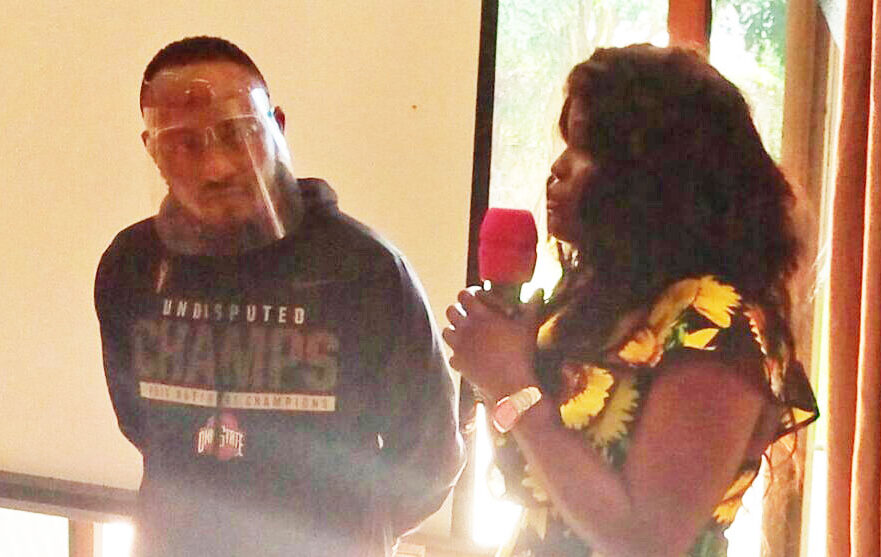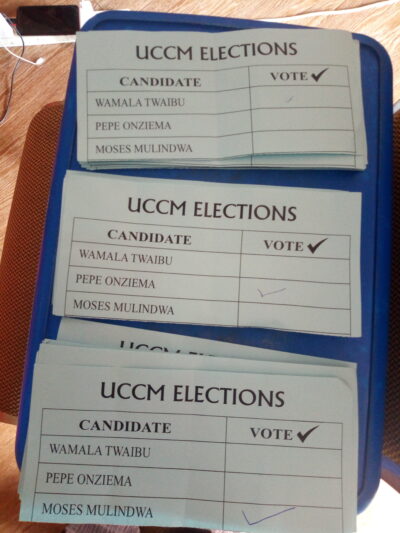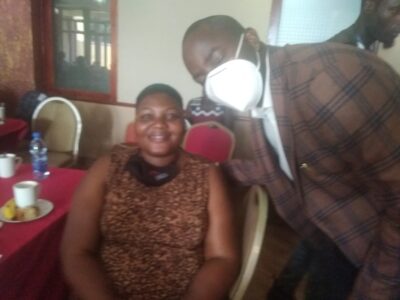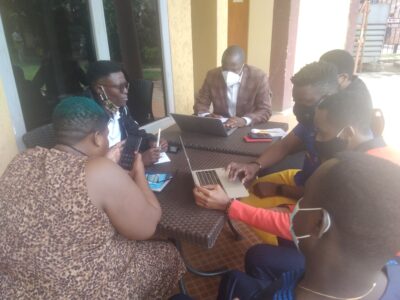LGBTQ+ Ugandans, sex workers and other Ugandans most at risk of HIV infections have elected their two representatives to the panel overseeing health projects financed by the Global Fund.

Sanyu Hajjarah Batte (right) and Moses Mulindwa Kimbugwe, the two elected representatives. (UhspaUganda photo)
By Kikonyogo Kivumbi
That panel, the Country Coordinating Mechanism (CCM), makes decisions about utilization and programming of health funds from Global Fund grants to Uganda.
In addition to two representatives of specific key populations (KPs) at risk of HIV, the panel also includes representatives of many other sectors of Ugandan society.
Moses Mulindwa Kimbugwe was elected to the CCM as the substantive representative of KPs and Sanyu Hajjarah Batte as the alternate representative, each for three years.
The election, held Nov. 13 in Kampala, was a race among four candidates that also included Pepe Onziema (trans man) and Twaibu Wamala (an advocate for drug users). Other candidates didn’t make it through vetting process.
Kimbugwe got 21 votes; Wamala, 14 votes; and Onziema, seven votes.
For the position of alternate representative, Batte from the sex workers constituency was elected unopposed.
Onziema and Wamala amicably conceded to the results of the vote and pledged to work with the two elected representatives.
During their victory speeches, both Batte and Mulindwa pointed to the struggle ahead. They observed that key populations are not yet organised as a self- coordinating entity. Self-coordinating entities are clusters of stakeholders with similar areas of interest that come together in order to enhance participation, coordination and effectiveness on specific aspects of the national AIDS response. This shortcoming, they said, hampers access to resources that could enhance KP programmes and strengthen capacity-building of KP institutions.
But they said they sensed good will on the side of the Uganda Aids Commission, which would make a difference.
The votes were cast by the KP electoral college, which consists of:
- Lesbians, Gay, Bisexuals
- Sex workers
- People who use and inject drugs (PWUIDS)
- Truck drivers
- Fisherfolk
- Police
- Uganda Peoples Defence Forces (UPDF)
- Transgender persons.

These were some of the ballots that were cast Nov. 13 in Kampala. (UhspaUganda photo)
Other constituencies also elect members of to the CCM board to represent the central government, civil society organizations (CSOs), the academic sector, youths, people affected by TB and malaria, private sector, UN agencies and other bilateral agencies.
The selection of KP representatives to the CCM board ensures that programming for the LGBT community will be included in the country’s national HIV/AIDS response. The CCM board in Uganda is hosted by the Uganda Aids Commission under the Office of the Ugandan President.

Dr Daniel Byamukama, a representative from the Uganda Aids Commission, and Ms Daisy Nakato, the cordinator of the Uganda Network of Sex Workers Organisations (UNESEO), during the elections. (UhspaUganda photo)

Members of the key population vetting committee checks for candidates’ eligibility before the elections. (UhspaUganda photo)
Kikonyogo Kivumbi, the author of this article, is the executive director of the Uganda Health and Science Press Association.
COMMENTS